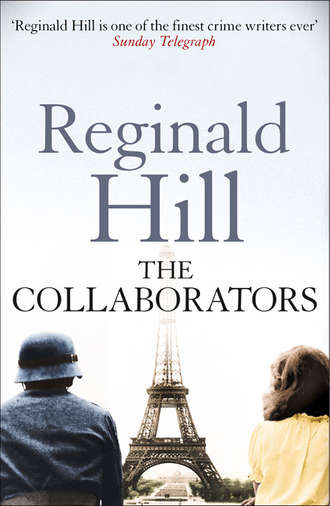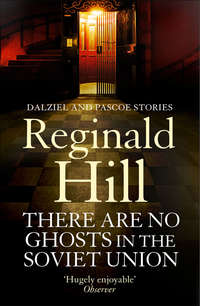
Полная версия
The Collaborators
It was a baker’s shop, not very big, but dignified by the words Boulangerie Pâtisserie parading above the windows in ornate lettering, and decorated by glass-covered designs around the door which featured a sturdy farmer and his elegant wife and promised ‘Pains Français et Viennois, Pains de Seigle, Chaussons aux Pommes et Gâteaux Secs’.
On the glass of the door was engraved ‘Crozier Père et Fils depuis 1870’, underlined by a triangle of curlicues, eloquent of the pride with which that first Crozier had launched his business seventy years before. The same year in which, if Mai’s history served him well, the Franco-Prussian war began. Perhaps other occupying Germans had been customers at this shop!
The shop window was fairly bare. But the smell of baking was rich and strong.
He pushed open the door and went in. There was one customer, one of those Frenchwomen of anything between fifty and a hundred who wear black clothes of almost Muslim inclusiveness whatever the weather. She was being served by a stout woman in middle age with the kind of flesh that looked, not unfittingly, as if it had been moulded from well-kneaded dough.
The black-swathed customer looked in alarm at Mai’s uniform, said abruptly, ‘Good morning, Madame Crozier,’ and left.
‘Good morning, Madame Duval,’ the stout woman called after her. ‘Monsieur?’
Her attempt at sang-froid failed miserably.
He set about allaying her fears.
‘Madame,’ he said in his rolling Alsatian French. ‘I have been drawn here by the delectable odours of what I’m sure is your superb baking. I would deem it an honour if you would allow me to purchase a few of your croissants.’
The woman’s doughy features stretched into a simper.
‘Claude!’ she shouted.
The door behind her opened, admitting a great blast of mouth-watering warmth and a man cast in the same mould, and from the same material, as his wife.
‘What?’ he demanded. Then he saw the uniform, and his face, which would have made him a fortune in the silent movies, registered fearful amazement.
‘Good day, monsieur,’ said Mai. ‘I was just telling your wife how irresistible I found the smell of your baking.’
‘Claude, are there any more croissants? The officer wants croissants,’ said Madame Crozier peremptorily.
‘No, I’m sorry…’ began the man.
‘Well, make some, Claude,’ commanded the wife. ‘If the officer would care to wait, it will only take a moment.’
The man went back into the kitchen and the woman brought Mai a chair. As she returned to the counter the door burst open. A good-looking woman of about twenty-five with dishevelled fair hair and a pale smudged face rushed in. She was carrying a child of about two years and at her heels was a boy a few years older.
She cried, ‘Maman, are you all right? Madame Duval said the Boche were here!’
‘Janine!’ exclaimed the woman. ‘What are you doing back? Why aren’t you in Lyon? Oh the poor baby! Is she ill?’
The child in arms had begun to cry. Madame Crozier reached over the counter and took her in her arms with much cooing.
‘No, she’s just hungry,’ said the girl, then broke off abruptly as for the first time she noticed Mai sitting quietly in the corner, almost hidden by the door. She was not however the first of the newcomers to notice him. The young boy’s eyes had lit on him as soon as he came in and the lad had thereafter fixed him with a disconcertingly level and unblinking gaze.
Mai got to his feet.
‘I’m sorry, madame,’ he said. ‘Please do not let me disturb this reunion.’
‘No, wait,’ cried Madame Crozier. ‘Claude! Where are those croissants?’
‘They’re coming, they’re coming!’ came the reply, followed almost immediately by the opening of the door. Once again Mai had the pleasure of seeing that cinematic amazement.
‘Janine!’ cried Crozier. ‘What’re you doing here? Why’ve you come back?’
‘Because the Boche dropped bombs and fired bullets at everyone on the road,’ cried Janine vehemently. ‘They could see we were a real menace. Men, women, children, animals, all running south in terror. Oh yes, we were a real menace!’
Sighing, Mai put on his cap. Not even the best croissants in the world were worth this bother.
‘But you’re not hurt, are you? And the children are all right? Claude, the officer’s croissants!’
The man put the croissants in a bag and handed it to Mai. He reached into his pocket. The woman said, ‘No, no. Please, you can pay next time.’
A good saleswoman thought Mai approvingly. Ready to risk a little for good will and the prospect of a returning customer. The young woman was regarding him with unconcealed hostility. As he took the croissants he clicked his heels and made a little bow just as Major Zeller would have done. She too might as well have her money’s worth.
He left the shop, pausing in the doorway as if deciding which way to go. Behind him he heard the older woman say, ‘Oh look at the poor children, they’re like little gypsies. And you’re not much better, Janine.’
‘Mother, we’ve been walking for days! We slept in a barn for two nights. Has there been any news of Jean-Paul?’
‘No, nothing. Now come and sit down and have something to eat. Pauli, child, you look as if you need fattening for a week. Claude, coffee!’
Mai left, smiling but thoughtful. These French! Some of his masters believed that, properly handled, they could be brought into active partnership with their conquerors. With the baker and his wife it might be possible. Be correct, avoid provocative victory parades, use clever propaganda, offer them a fair armistice and business as usual; yes they might grumble, but only as they grumbled at their own authorities. But they’d co-operate.
Alas, not all the French were like Monsieur and Madame Crozier. Take that girl, so young, so child-like, but at the same time so fierce!
He turned left at the Bassin in the Luxembourg Gardens. As he skirted the lush green lawn before the Palace, he saw two German soldiers on guard duty. They were looking towards him and he remembered he was still in uniform. The sooner he got out of it the better. One of the joys of being an Abwehr officer was the excuse it gave for frequently wearing civilian clothes. The sentries offered a salute. He returned it, realized he was still clutching a croissant, grinned ruefully and bore right to the Medici Fountain.
Slowly he made his way alongside the urn-flanked length of water to take a closer look at the sculpture. In the centre of three niches a fierce-looking bronze fellow loomed threateningly above a couple of naked youngsters in white marble. Us and the French! he told himself, crumbling a croissant for the goldfish.
A hand squeezed his elbow. He started, turned and saw a thin bespectacled man showing discoloured teeth in a smile at once impudent and ingratiating.
‘Hello, lieutenant. Didn’t use to be able to creep up on you like that!’
‘Hello, Pajou,’ said Mai coldly.
The man turned up the ingratiating key.
‘I was really glad when I realized you were in town, lieutenant. That Mai’s a man I can trust, a man I can talk to. So here I am, reporting for duty. Do you think you can use me?’
Mai returned his gaze to the crouching cyclops, Polyphemus, poised so menacingly over the entwined figures of Acis and Galatea.
‘Yes, Pajou,’ he sighed. ‘I very much fear we can.’
2
Sophie Simonian was praying for her son when a knock at the door and a voice calling, ‘Bubbah Sophie, it’s me, Janine,’ made her hope for a second that her prayers had been answered.
Leaning heavily on a silver-topped cherry cane, she went to the door, opened it, and knew at once that there was no good news in her daughter-in-law’s face. On the other hand, there was no bad news either, thanks be to God for small mercies.
‘Bubbah, how are you? You look well,’ said Janine embracing her. ‘Is there any news of Jean-Paul?’
‘Nothing. No news at all. Sit down, my dear. Where are the children?’ In sudden alarm, ‘There is nothing wrong with the children? Why are you back in Paris?’
‘No, they’re fine, really. Pauli sends his love, and Céci too. I’ll bring them round soon. But I thought I’d come myself first so we can have a good talk.’
Quickly she described her abortive flight, her slow return. Unlike her own parents, Sophie had approved her decision to leave, though refusing (thank God!) Janine’s offer to take her too. Nearly seventy with a rheumatic knee, a return on foot would have been quite beyond her. Besides, she’d done her share of refugeeing almost forty years before, after the great pogrom of 1903 in Kishinev. France had offered a new life in every sense. It was here in Paris when hope seemed dead that at last she had conceived and given birth to a son. Iakov Moseich he was named after his father, and Jean-Paul, to tell the world he was a native-born Frenchman.
Her husband had died of a heart attack in 1931. Jean-Paul had wanted to abandon his university place due to be taken up the following year and get a job to look after his mother. She had told him scornfully that his father would have struck him for such self-indulgent sentimentality. It was time to start acting like a real Frenchman and not a joke-book Jewish son.
He certainly took her at her word, she later told herself ironically. During the next few years, he abandoned his religion, declared himself an atheist, flirted with the Communist Party, and announced that he was going to marry Janine Crozier. This last was perhaps the biggest shock of all. Some left-wing intellectual shiksa from the university she could have understood. But this wide-eyed child, of parents whose attitudes were as offensive to his new political religion as to his old racial one, was a complete surprise. When finally she had been unable to contain the question, ‘Why! Why! Why do you want to marry this child? She isn’t even pregnant!’ he had given her the only reply which could silence her: ‘Because whenever I see her, I feel happy.’
But six years and two grandchildren later, Sophie was completely converted, and during this trying time she had derived much comfort from her daughter-in-law.
As Janine finished her tale, there was a knock at the door and a man’s voice called reassuringly, ‘It’s only me, Madame Simonian. Christian.’
Janine opened the door. Christian Valois was standing there, in his arms a dark ginger cat with a smudge of black hair around his nose.
‘Janine!’ he said. ‘Is there news?’
Janine shook her head and said, ‘No. Nothing. Hello, Charlot, you’re fatter than ever!’
The cat purred as she scratched him and then jumped out of Valois’s arms and bounced on to Sophie’s lap.
‘I met him on the stairs,’ said Valois, kissing the old lady. ‘You’ve heard nothing either, madame? Of course not. Why doesn’t he write to one of us?’
His voice was full of concern which slightly irritated Janine. True, he was a very old friend of Jean-Paul’s, but this hardly entitled him to put his concern on a level with, if not above, that of a wife and a mother.
‘We are going to have some tea, Christian. Will you stay?’ said Sophie.
‘Just for a moment. I have to get back.’
‘Back where?’ asked Janine in surprise. ‘Surely there is no work for you to do. I thought everyone to do with the Government had run off to Bordeaux?’
‘I stayed,’ said Valois shortly.
In fact, his gesture in staying on at the Ministry was proving rather a strain. It hadn’t taken the Germans long to realize that he had neither authority nor function. A friendly Wehrmacht officer had suggested that if he was worried about his pay, he’d quite happily sign a weekly chitty certifying that the undermentioned civil servant had attended his place of work. This kindly condescension was far more infuriating than any hostility or threat could have been.
‘That was brave,’ said Janine sincerely.
Valois’s thin sallow face flushed. He opened his mouth, realized he was going to say something pompous about duty, bit it back and said instead, ‘Thank you.’
The two young people smiled at each other. Sophie Simonian noted this with approval. She liked young Christian and it had always seemed a shame that he and Janine didn’t get on. A man’s first loyalty was to his family, but he needed his friends too, much more than a woman did.
As they sat and drank their tea, Janine told her story once more. Valois frowned as she told of the German planes attacking the refugee column.
‘Bastards!’ he said.
‘It’s war,’ said Sophie. ‘What do you expect? Stop the war is the only way to stop the killing.’
‘You think so? Perhaps. Only the war will not stop, will it?’
‘But the Marshal is talking with the Germans about a truce,’ cried Janine. ‘It was on the wireless.’
‘Truce? Defeat, you mean. Is that what you want?’ demanded Valois.
‘No! I mean, I don’t know. I hate the Germans, I want to see them thrown out of France, of course I do. But the only way for Jean-Paul to be safe is for the fighting to stop! I mean it’s stupid, he’s out there on the Maginot Line somewhere and all the Germans are here in France behind him! I mean it’s just so bloody, bloody stupid!’
She was close to tears. Sophie put her arm around her and frowned accusingly at Valois.
‘I’m sorry,’ he said. ‘You know I’m worried about Jean-Paul too. Listen, there will be a truce, an armistice, something like that, I’m sure. He’ll be safe. But that’s not what I mean when I say the war won’t end. De Gaulle’s gone to England, a lot of them have. I heard him on the British radio saying that he would fight on no matter what happened back here.’
‘De Gaulle? Who’s he?’ asked Janine.
‘He’s a general, a friend of the Marshal’s.’
‘But the Marshal wants a truce, doesn’t he?’
‘That’s right.’
‘And everyone says the Boche will be in England soon too. There’s nothing to stop them, is there? What does this de Gaulle do then? Go to America?’ asked Janine scornfully.
‘At least there’s someone out there not giving up,’ said Valois.
He finished his tea and stood up. Janine saw his gaze drift round the room coming to rest on the large silver menorah on the window sill.
‘Are the other apartments still occupied?’ he asked casually.
Sophie said, ‘A lot went. Soon they’ll be back when they see it’s safe, no doubt. Madame Nomary, the concierge, is still in the basement. Like me, too old to run. And Monsieur Melchior is still upstairs.’
‘Melchior?’
‘You must have seen him,’ said Janine. ‘The writer. Or artist. Or something like that. At least he dresses that way, you know, flamboyantly. I think he’s…’
‘He likes the men more than the ladies is what she doesn’t care to say in front of silly old Bubbah,’ mocked Sophie. ‘But he’s a gentleman and very quiet, especially since the war. I think he’s been hiding up there, poor soul. Why so interested in my neighbours, Christian?’
‘No reason. I must go, Madame Sophie. Take care.’
‘I’d better go too and rescue maman from the kids,’ said Janine, jumping up. ‘Bye, Bubbah. I’ll bring Pauli and Céci next time.’
‘Be sure you do, child. God go with you both.’
Outside in the steepsided canyon of the Rue de Thorigny they walked in silence for a little way.
Finally Janine said, ‘What’s worrying you about Sophie, Christian?’
He shot her a surprised glance then said, ‘I thought I was a better actor! It’s nothing. I was just wondering how I could suggest that it might be politic not to, well, advertise her Jewishness…’
‘In the Marais? Don’t be silly. And why would you say such a thing?’
‘You must have heard how the Boche treat Jews. Some of the stories…’
‘But that’s in Germany,’ protested Janine. ‘They wouldn’t dare do anything here, not to Frenchmen. The people wouldn’t let it happen!’
‘You think not? I hope so,’ he said doubtfully.
‘I’m glad you didn’t say anything, though. It would really have worried Bubbah.’
‘It wasn’t just her I was concerned about,’ said Christian gently.
‘Me? Why should it worry…oh my God. Jean-Paul, you mean? If they capture Jean-Paul…’
She stood stricken.
‘I’m sorry,’ he said. ‘It probably won’t happen. And he’ll be a prisoner-of-war in any case, under the Geneva Convention…where are you going?’
She’d set off at a pace that was more of a trot than a walk. Looking back over her shoulder she cried, ‘I’ve got to get back to the children, see they’re all right. Goodbye, Christian.’
‘Goodbye,’ he said. ‘I’ll call…’
Already she was out of earshot. He headed west, frowning, and in a little while turned on to the Rue de Rivoli. He walked with his shoulders hunched, his head down, and did not see, or at least did not acknowledge seeing, the huge red and black swastika banners which fluttered everywhere like prospectors’ flags to mark out what the Germans were claiming for their own.
3
‘Hey kid, what’s your name?’
Pauli looked up at the man who’d just appeared in the doorway of the little courtyard behind the baker’s. He was a big man with long red hair, a longer beard and a strong curved nose. He looked as if he’d been living rough and as he moved nearer, Pauli realized he smelt that way too.
‘Pauli,’ he said. ‘Well, Jean-Paul, really. But maman calls me Pauli.’
‘Pauli, eh? Maman, you say? Would that be Janine?’
‘Yes, that’s maman’s name,’ said the boy.
‘Well, I’ll be blowed. And look at the size of you! Little Janine’s boy! Well, I’m your Uncle Miche, Pauli. Not really your uncle, more your half-cousin, but uncle will do nicely till I’ve stood out in the rain long enough to shrink to your size.’
This reversal of the usual adult clichés about growing up into a big boy amused and reassured Pauli. He stood his ground as the big man moved forward and rested a hand on his head. He noticed with interest that this new and fascinating uncle did indeed seem to have been standing out in the rain. His shapeless grey trousers and black workman’s jacket were damp with the moisture which the morning sun was just beginning to suck up from the high roofs. Here in the confined yard, it was still shadowy and chill. Michel Boucher shivered but with a controlled shiver like an animal vibrating its flesh for warmth.
‘Why don’t we go inside and surprise Uncle Claude?’ he said. ‘I bet it’s nice and warm in the bakehouse!’
It was. There were two huge ovens, one down either side of the vaulted ochre-bricked building and both were going full blast. Claude Crozier was removing a trayful of loaves from one of them to add to the morning’s bake already cooling on the long central table. Boucher looked at the regiments of bread with covetous eyes and said, ‘Morning, Uncle Claude. How’s it been with you? Christ, there’s a grand smell in here!’
The baker almost dropped his tray in surprise.
‘Who’s that? Michel, is that you? What the blazes are you doing here?’
‘Just passing, uncle, and I thought I’d pay my respects.’
‘Kind of you, but just keep on passing, eh? Before your aunt sees you.’
Crozier was not a hard man but his nephew was an old battle, long since lost. The baker had been more than generous in the help he gave his widowed sister to bring up her two children. But when within the space of a year, their mother had died of TB, Mireille had married a farmer on holiday and gone to live in the Ain region, and Miche had got two years’ juvenile detention for aggravated burglary, Louise broke her disapproving silence and said, ‘Enough’s enough. Not a penny more of our hard-earned money goes to that ne’er-do-well. He’ll never be more than a crook, you’ll see.’
Now here he was again.
‘You can’t stay,’ said Crozier urgently.
‘Oh I won’t stay, uncle,’ said Boucher. ‘Just long enough for a bite of breakfast, eh?’
The baker’s consternation at this prospect changed to terror as the door to the shop opened and his wife came in.
She stopped dead at the sight of Boucher.
‘Morning, Auntie Lou,’ he called cheerfully. ‘Just dropped in to pay my respects. And have a bite of breakfast.’
He took a couple of steps nearer the tray of new-baked bread as he spoke.
‘My God!’ cried the woman, peering closely at him. ‘You’re wet! You’re dirty! You’re unshaven! And you smell!’
Her tone was triumphant as well as indignant. There were few pleasures dearer to her bourgeois heart than being justified in a fit of moral indignation.
‘Yes, well, I’ve been down on my luck a bit,’ said Boucher.
Suddenly Pauli moved forward to the table, picked up a roll and presented it to the man.
‘Thanks, kid,’ he said, already shedding crumbs with the second syllable.
‘Pauli, what are you doing! How dare you?’ thundered Louise.
‘Maman, what’s going on? Why’re you shouting at Pauli?’
Janine, attracted by her mother’s bellow, had appeared in the doorway. She looked at Boucher without recognition.
‘I just gave Uncle Miche a roll,’ explained the little boy tearfully.
‘Hello, Cousin Janine. This is a good lad you’ve got here,’ said Boucher. He stuffed the rest of the roll into his mouth. ‘Delicious! Well, I’ll be on my way. Don’t want to outstay such a generous welcome. Cheers, kid.’
He patted Pauli on the head again, gave a mock military salute and left.
Pauli ran to his mother and said, ‘Maman, he was all wet. He says he stands out in the rain to shrink.’
‘You’ll have to do something about that boy,’ said Louise, annoyed at feeling in the wrong. ‘The sooner he gets off to school, the better.’
Janine glared at her mother, then turned and ran back into the shop. A moment later they heard the shop door open and shut.
She met her cousin as he came out of the passage which led into the rear yard.
‘Here,’ she said, stuffing a note into his hand. ‘It’s not much, but I haven’t got much.’
He looked at the money, making little effort to hide his surprise.
‘Thanks, cousin,’ he said. ‘Things have changed, eh?’
‘What do you mean?’
‘Last time we met, you were still at school, I think. You told me you weren’t permitted to speak to degenerates. Exact words!’
Janine flushed, then laughed as she saw Boucher was laughing at her.
‘People grow up,’ she said.
‘Not me,’ he said. ‘Not if I can help it.’
‘What are you doing, Miche?’
‘I’m not sure,’ he said. ‘I thought somehow, when this lot started, I’d be fighting the Boche, slate wiped clean sort of thing. But the first flic who recognized me came charging after me waving his cuffs! So I’ve had to keep my head down. It’s been a bit rough, but it’ll get sorted sooner or later I don’t doubt.’
‘Haven’t you got anywhere to stay?’ asked Janine sympathetically.
‘No. Well, I was all right at first. I shacked up…I mean lodged with an old friend. Arlette la Blonde, stage name, does an exotic dance at the Golden Gate, I don’t expect you know her. Well, that was all right, only a few days back, they opened up again and well, late hours and that, it wasn’t convenient, you know these show people…’
He tailed off as he realized that this time she was laughing at him.
‘You mean she brings friends back for the night and they don’t care to find your head on the pillow already!’
‘Yeah, that’s it,’ he said grinning. Then he stopped grinning.
‘I could have hung on there, slept days. Only I found she was bringing back Krauts! That really got up my nose! So I slung my hook.’
‘You won’t have to be so choosy, Miche. Not now they’re our friends.’









